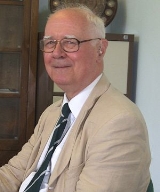
John Polkinghorne
Topics
John Polkinghorne
Quotations

Quotations
John Polkinghorne is a British particle physicist and theologian. He has written extensively on matters concerning science and faith, and was awarded the Templeton Prize in 2002.
Sourced
- Quantum theory also tells us that the world is not simply objective; somehow it's something more subtle than that. In some sense it is veiled from us, but it has a structure that we can understand.
- Divine Action: An Interview with John Polkinghorne by Lyndon F. Harris in Cross Currents, Spring 1998, Vol. 48 Issue 1.
Quarks, Chaos & Christianity (1995)
- Let me end this chapter by suggesting that religion has done something for science. The latter came to full flower in its modern form in seventeenth-century Europe. Have you ever wondered why that's so? After all the ancient Greeks were pretty clever and the Chinese achieved a sophisticated culture well before we Europeans did, yet they did not hit on science as we now understand it. Quite a lot of people have thought that the missing ingredient was provided by the Christian religion. Of course, it's impossible to prove that so - we can't rerun history without Christianity and see what happens - but there's a respectable case worth considering. It runs like this.
The way Christians think about creation (and the same is true for Jews and Muslims) has four significant consequences. The first is that we expect the world to be orderly because its Creator is rational and consistent, yet God is also free to create a universe whichever way God chooses. Therefore, we can't figure it out just by thinking what the order of nature ought to be; we'll have to take a look and see. In other words, observation and experiment are indispensable. That's the bit the Greeks missed. They thought you could do it all just by cogitating. Third, because the world is God's creation, it's worthy of study. That, perhaps, was a point that the Chinese missed as they concentrated their attention on the world of humanity at the expense of the world of nature. Fourth, because the creation is not itself divine, we can prod it and investigate it without impiety. Put all these features together, and you have the intellectual setting in which science can get going.
It's certainly a historical fact that most of the pioneers of modern science were religious men. They may have had their difficulties with the Church (like Galileo) or been of an orthodox cast of mind (like Newton), but religion was important for them. They used to like to say that God had written two books for our instruction, the book of scripture and the book of nature. I think we need to try to decipher both books if we're to understand what's really happening.- page 29-30.
- God is not a God of the edges, with a vested interest in beginnings. God is the God of the whole show.
- page 51.
- God didn't produce a ready-made world. The Creator has done something cleverer than this, making a world able to make itself.
- page 64.
- There is much cloudy unpredictable process throughout the whole of the physical world. It is a coherent possibility that God interacts with the history of creation by means of "information input" into its open physical process. The causal net of the universe is not drawn so tight as to exclude this possibility. Mere mechanism is dead, and a more subtle and supple universe is accessible to the providential interaction of the Creator.
- page 89.
Silverdale Interactive © 2026. All Rights Reserved.

